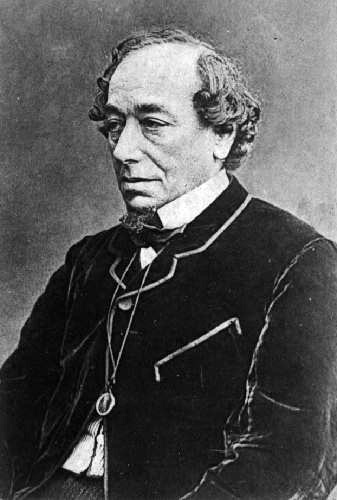Benjamin Disraeli najznámejšie citáty
Benjamin Disraeli Citáty o láske
Potvrdené výroky
Zdroj: MÜHS, Wilhelm: Slovom srdca, 365 myšlienok o láske. Bratislava: Nové mesto, 2000, s. 200. ISBN 80-85487-61-6
Benjamin Disraeli citáty a výroky
Benjamin Disraeli: Citáty v angličtine
Speech http://hansard.millbanksystems.com/commons/1851/feb/11/agricultural-distress in the House of Commons (2 February 1851).
1850s
Bk. I, Ch. 13.
Books, Coningsby (1844), Tancred (1847)
Zdroj: From the window of 10 Downing Street, after arriving from Dover (16 July 1878), quoted in 'Return Of Lord Beaconsfield And Lord Salisbury', The Times (17 July 1878), p. 5.
“That fatal drollery called a representative government.”
Bk. II, Ch. 13.
Books, Coningsby (1844), Tancred (1847)
Zdroj: Speech https://api.parliament.uk/historic-hansard/commons/1871/feb/09/address-to-her-majesty-on-her-most in the House of Commons (9 February 1871) on the Franco-Prussian War which led to German unification.
Speech in the House of Lords on the state of agriculture (28 March 1879), reported in The Times (29 March 1879), p. 8.
1870s
“Real politics are the possession and distribution of power.”
Zdroj: Books, Coningsby (1844), Endymion (1880), Ch. 71 .
Zdroj: Speech at Dover, England after arriving from the Congress of Berlin (16 July 1878), quoted in 'Return Of Lord Beaconsfield And Lord Salisbury', The Times (17 July 1878), p. 5.
Speech at the Printing Trade Festival (1845).
1840s
“Taking a new step, uttering a new word, is what people fear most.”
This comes from Dostoevsky's Crime and Punishment, part 1, chapter 1.
Misattributed
“I am dead: dead, but in the Elysian fields.”
Zdroj: Remark to Lord Aberdare on being welcomed to the House of Lords (1876), cited by Stanley Weintraub, Disraeli: A Biography (1993), p. 563.
Preface.
Books, Coningsby (1844), Lothair (1870)
Book 4, Chap. 1.
Books, Coningsby (1844)
“No man is regular in his attendance at the House of Commons until he is married.”
Theory held by Disraeli, cited in Sir William Fraser, Disraeli and his Day (1891), p. 142.
Sourced but undated
“Finality, Sir, is not the language of politics.”
Speech http://hansard.millbanksystems.com/commons/1859/feb/28/leave in the House of Commons (28 February 1859).
1850s
“The practice of politics in the East may be defined by one word: dissimulation.”
Part 5, Chapter 10.
Books, Coningsby (1844), Contarini Fleming (1832)
“The characteristic of the present age is a craving credulity.”
Zdroj: Speech at Oxford Diocesan Conference (25 November 1864), quoted in William Flavelle Monypenny and George Earle Buckle, The Life of Benjamin Disraeli, Earl of Beaconsfield. Volume II. 1860–1881 (London: John Murray, 1929), p. 105.
“Individuals may form communities, but it is institutions alone that can create a nation.”
Speech in the Guildhall, London (9 November 1866), quoted in The Times (10 November 1866), p. 9
1860s
Zdroj: Books, Coningsby (1844), Endymion (1880), Ch. 26.
“I have always thought that every woman should marry, and no man.”
Zdroj: Books, Coningsby (1844), Lothair (1870), Ch. 30.
“The choicest pleasures of life lie within the ring of moderation.”
Actually a line from Martin Tupper's Proverbial Philosophy.
Misattributed
Speech http://hansard.millbanksystems.com/commons/1846/jan/22/address-in-answer-to-the-speech in the House of Commons (22 January 1846).
1840s
Undated letter to Rosina Bulwer Lytton, cited in Andre Maurois, Disraeli: A Picture of the Victorian Age (1927), p. 114.
Sourced but undated
Zdroj: Books, Coningsby (1844), Endymion (1880), Ch. 81. An anecdote is related of Sir Anthony Ashley Cooper (1621–1683), who, in speaking of religion, said, "People differ in their discourse and profession about these matters, but men of sense are really but of one religion." To the inquiry of "What religion?" the Earl said, "Men of sense never tell it", reported in Burnet, History of my own Times, vol. i. p. 175, note (edition 1833).
Zdroj: Speech to the Conservatives of Manchester (3 April 1872) on the monarchy, quoted in William Flavelle Monypenny and George Earle Buckle, The Life of Benjamin Disraeli, Earl of Beaconsfield. Volume II. 1860–1881 (London: John Murray, 1929), p. 527.
Speech at banquet of the National Union of Conservative and Constitutional Associations, Crystal Palace, London (24 June 1872), cited in "Mr. Disraeli at Sydenham," The Times (25 June 1872), p. 8.
1870s
“The age of chivalry is past. Bores have succeeded to dragons.”
Book II, Chapter 5.
Books, Coningsby (1844), The Young Duke (1831)
Zdroj: Referring to Frederick Temple, letter to Queen Victoria (4 November 1868), cited in The Letters of Queen Victoria, 2nd series) (1926), ed. George Earle Buckle, p. 550.
